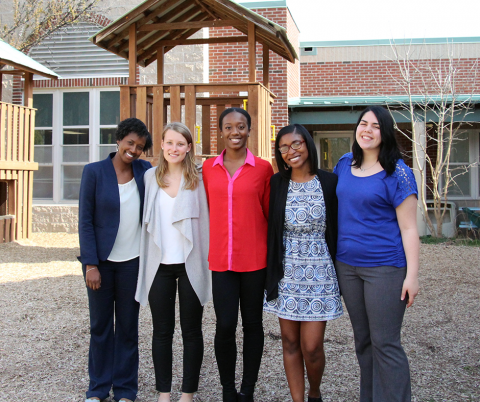Schooling and Parenting: Implications for Students' Academic Identity (2016-2017)
School tracking—the division of students into separate classes or groups based on perceived ability—is a major mechanism through which schools perpetuate achievement disparities in children from different racial, ethnic and socioeconomic backgrounds. Despite significant attention to tracking, there is still much that is unknown about the implications of tracking on students’ academic identification—the connection between one’s personal identity and one’s role as a student.
A favorable academic identity is associated with higher grades, motivation and classroom participation as well as lower dropout rates and participation in deviant behaviors. Therefore, identifying resources that guard against the negative consequences of tracking for academic identity could have implications for numerous factors that capture youths’ academic experience.
This Bass Connections project conducted a quantitative and qualitative study with sixth graders and teachers from four middle schools in a middle-class Southeastern school district. The study’s purpose was to explore two questions: How does tracking impact sixth graders’ academic identity? How do sixth graders’ perceptions of their math and English language arts teachers impact their academic identity? The team’s findings showed that being in the accelerated math track—but not in the regular track—was significantly associated with having a stronger academic identity. Students’ positive perceptions of their teachers were significantly associated with having a stronger academic identity.
The team’s study provides new evidence on predictors of academic identity. Students’ perceptions of teachers are important for academic identity development and school interventions. This study adds to the literature on how tracking contributes to disparities in students’ achievement outcomes.
Timing
Fall 2016 – Spring 2017
Team Outcomes
Teachers’ Racial Biases and the Opportunity Gap: Implications for Black Students’ Academic Success (poster by Kamilah Legette, Jennifer Acosta, Victoria Prince, Cecelia Garrett, Jennifer Lansford, presented at American Educational Research Association 2018 Annual Meeting, New York, NY, April 16, 2018)
Examining Tracking and Students’ Perceptions of Teachers as Predictors of Academic Identity (poster by Jennifer Acosta, Victoria Prince, Nia Moore, Celia Garrett, Kamilah Legette, Jennifer Lansford, presented at EHDx, Duke University, April 19, 2018)
Schooling and Parenting: Implications for Students’ Academic Identity (presentation by Jennifer Acosta, Celia Garrett, Nia Moore and Victoria Prince, EHDx Talks, April 19, 2017)
Objective Subjects, Empirical Identities: Psychology’s Measurement of Ethnic Identity and Critical Race and Ethnicity Theory (honors thesis by Jennifer Acosta, Global Cultural Studies)
Video
Schooling and Parenting: Implications for Students’ Academic Identity
Reflections
This Team in the News
From a Bass Connections Team to Career in Education Research
Jennifer Acosta: Learning through DukeImmerse
2016-2017 Global Human Rights Scholars
See photos of this team on Flickr
This project team was originally part of the Education & Human Development theme of Bass Connections, which ended in 2022. See related team, Contextual Influences on Children’s Identity Development (2017-2018).

Team Leaders
- Jennifer Lansford, Sanford School of Public Policy
- Kamilah Legette, Social Science Research Institute
/undergraduate Team Members
-
Jennifer Acosta, Psychology (AB), GCS in Literature Progrm (AB2)
-
Celia Garrett, Public Policy Studies (AB)
-
Nia Moore, Public Policy Studies (AB)
-
Victoria Prince, Public Policy Studies (AB)
-
Keitavious (Trey) Walk, History (AB)
/yfaculty/staff Team Members
-
Angel Harris, Arts & Sciences-Sociology
/zcommunity Team Members
-
Chapel Hill-Carrboro Public School System
